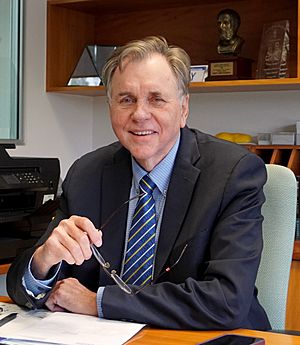Barry Marshall facts for kids
Quick facts for kids
Barry Marshall
|
|
|---|---|

Marshall in 2021
|
|
| Born |
Barry James Marshall
30 September 1951 Kalgoorlie, Western Australia
|
| Alma mater | University of Western Australia (MBBS) |
| Known for | Helicobacter pylori |
| Spouse(s) |
Adrienne Joyce Feldman
(m. 1972) |
| Children | 4 |
| Awards |
|
| Scientific career | |
| Fields | |
| Institutions | |
Barry James Marshall is an Australian doctor and scientist who won the Nobel Prize in Physiology or Medicine. He is a professor of Microbiology at the University of Western Australia. Along with Dr. Robin Warren, he made a huge discovery about stomach ulcers. For many years, doctors thought ulcers were caused by stress or spicy foods. But Marshall and Warren showed that a tiny germ called Helicobacter pylori (or H. pylori) was actually the main cause. This discovery changed how doctors treat ulcers and also helped us understand how H. pylori can lead to stomach cancer.
Contents
Early Life and School
Barry Marshall was born on September 30, 1951, in Kalgoorlie, Australia. He lived in Kalgoorlie and Carnarvon until he was eight years old. Then, his family moved to Perth. His mother was a nurse, and his father had different jobs. Barry is the oldest of four children. He went to Marist College for high school. Later, he studied medicine at the University of Western Australia. He earned his medical degree in 1974. He married his wife, Adrienne, in 1972, and they have four children.
Discovering H. pylori
In 1981, while training at Royal Perth Hospital, Dr. Marshall met Dr. Robin Warren. Dr. Warren was a pathologist, a doctor who studies diseases. He was interested in gastritis, which is when the stomach lining gets inflamed. They both noticed spiral-shaped bacteria in the stomachs of patients with gastritis.
The Big Idea
In 1982, they successfully grew these bacteria in a lab. They named them H. pylori. They then came up with a bold idea: these bacteria might be causing stomach ulcers and even stomach cancer! Many scientists and doctors at the time found this hard to believe. They thought no bacteria could survive in the strong acid of the stomach. Dr. Marshall once said, "everyone was against me, but I knew I was right."
A Lucky Accident
Marshall and Warren got some money to research their idea for a year. They took samples from 100 patients. The first 30 samples didn't show any H. pylori growth. They later found out why: the lab technicians were throwing out the cultures after only two days. This was normal for other types of bacteria. But one time, a sample was left over the weekend, for five days. When they checked it, they found H. pylori! They realized that H. pylori grows much slower than other bacteria.
Proving the Theory
In 1983, they tried to share their findings with a group of stomach doctors. But their paper was turned down. To prove their point, Dr. Marshall did something very brave in 1984. After checking his own stomach with a camera (an endoscopy), he drank a liquid containing H. pylori bacteria. He expected to get an ulcer much later. But just three days later, he felt sick and had bad breath. On day eight, another endoscopy showed his stomach was very inflamed (gastritis). They found H. pylori growing there. After 14 days, he started taking antibiotics and got better.
This experiment was very important. It showed that H. pylori could cause gastritis. It helped prove that bacteria, not just stress, were behind stomach problems. This study was published in the Medical Journal of Australia in 1985.
Continuing Research
After his groundbreaking work, Dr. Marshall continued his research. He worked at the University of Virginia in the USA and later returned to the University of Western Australia (UWA). He still runs the H. pylori Research Laboratory at UWA.
In 2007, a special center was named after him: The Marshall Centre for Infectious Diseases Research and Training. This center studies many types of infections, not just H. pylori. Dr. Marshall also started the Noisy Guts Project in 2017. This team looks for new ways to diagnose and treat irritable bowel syndrome, a common gut problem.
Awards and Honors
Dr. Barry Marshall's work changed medicine forever. Because of his amazing discovery, he and Dr. Robin Warren were awarded the Nobel Prize in Physiology or Medicine in 2005. The Nobel Committee recognized them "for their discovery of the bacterium Helicobacter pylori and its role in gastritis and peptic ulcer disease."
He has received many other important awards, including:
- The Albert Lasker Award for Clinical Medical Research in 1995.
- The Buchanan Medal from the Royal Society in 1998.
- He became a Fellow of the Royal Society in 1999.
- The Keio Medical Science Prize in 2002.
- He was named Western Australian of the Year in 2006.
- He was appointed a Companion of the Order of Australia in 2007, which is a very high honor in Australia.
In 2015, his old university, UWA, renamed its science library the Barry J Marshall Library to honor him. Dr. Marshall is also an Ambassador for Life Sciences for Western Australia, helping to promote science in his home state.
See also
 In Spanish: Barry Marshall para niños
In Spanish: Barry Marshall para niños
- Timeline of peptic ulcer disease and Helicobacter pylori

